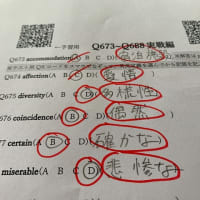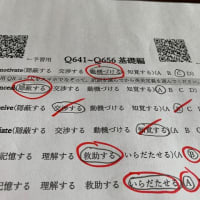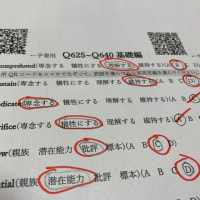ある程度のインプットの蓄積があってはじめてスムーズなアウトプットができるのはネイティブもノンネイティブも同じです。ネイティブの場合は周囲の大人が幼児のレベルのあったインプットを根気よく続けてくれるものの、ノンネイティブはそんな環境を望めません。しかし実力相応の英文の読書で効率的なインプットを重ねていけばアウトプット訓練も楽になります。
そんなわけで、著作権の切れた童話「ドリトル先生航海記」から、シンプルで、大学入試にもTOEICにも英検にも有効な練習問題を作成しています。楽しみながら英語力を伸ばしていただければ幸いです。
コロンで区切られているのが四語選択問題、スラッシュで区切られているのが四語整序問題です。四語選択問題の単語は大学入試、英検、TOEICに共通する重要単語で*印は難易度の目安です。*印が多いほど難しい単語になっています。無印は語法・文法等の問題です。
大学入試、英検、TOEICに童話は出題されないとはいえ、大多数の受験者が童話も満足に読めない現状では、童話や子どもニュースが楽に読めれば大いに有利です。
※(10)の解答①(ever)②(patient)③(she who gave me)④(heart to take her)⑤(terribly)⑥(wonder if she remained)⑦(legs could bring him)⑧(came up to us)⑨(peculiar)⑩(queer)⑪(face shining with happiness)⑫(clapped)⑬(terrible lot to say)⑭(him something about me)⑮(so interested listening to)⑯(nodded)⑰(to my great surprise)⑱(ugly)⑲(anxious)⑳(you gave me when)
(11)
"Well," said the parrot, turning to me, "I may have started the Doctor learning but I never could have done even that, ①(which : whether : when : if) he hadn't first taught me to understand what I was saying when I spoke English. You see, many parrots can talk like a person, but very few of them understand ②(saying / what / are / they). They just say it because—well, because they fancy it is smart or, because they know they will get crackers given them."
By this time we had turned and were going towards my home with Jip running in front and Polynesia still perched on the Doctor's shoulder. The bird chattered incessantly, mostly about Africa; but now she spoke in English, out ③(to / of / me / politeness).
"How is Prince Bumpo getting on?" asked the Doctor.
"Oh, I'm glad you asked me," said Polynesia. "I almost forgot to tell you. What do you think?—BUMPO IS IN ENGLAND!"
"In England!—You don't say!" cried the Doctor. "What ④(he / is / earth / on) doing here?"
"His father, the king, sent him here to a place called—er—Bullford, I think it was—to study lessons."
"Bullford!—Bullford!" ⑤**(deplored : muttered : mocked : cheated) the Doctor. "I never heard of the place—Oh, you mean Oxford."
"Yes, that's the place—Oxford," said Polynesia "I knew ⑥(cattle / it / in / had) it somewhere. Oxford—that's the place he's gone to."
"Well, well," murmured the Doctor. "Fancy Bumpo studying at Oxford—Well, well!"
"There were great doings in Jolliginki when he left. He was scared to death to come. He was the first man from that country to go ⑦*(vast : abroad : active : keen). He thought he was going to be eaten by white cannibals or something. You know what those niggers are—that ignorant! Well!—But his father made him come. He said that all the black kings were sending their sons to Oxford now. It was the fashion, and he would have to go. Bumpo wanted to bring his six wives with him. But the king wouldn't let him do that either. Poor Bumpo ⑧(off / went / tears / in)—and everybody in the palace was crying too. You never heard such a hullabaloo."
"Do you know if he ever went back in ⑨*(weapon : profit : search : outcome) of The Sleeping Beauty?" asked the Doctor.
"Oh yes," said Polynesia—"the day after you left. And a good thing for him he did: the king got to know about his helping you to escape; and he was dreadfully wild about it."
"And The Sleeping Beauty?—did he ever find her?"
"Well, he brought back something which he SAID was The Sleeping Beauty. Myself, I think it was an albino niggeress. She had red hair and the biggest feet you ever saw. But Bumpo was no end pleased with her and finally married her amid great rejoicings. The feastings ⑩*(lasted : consumed : united : examined) seven days. She became his chief wife and is now ⑪(there / known / as / out) the Crown-Princess BumPAH—you accent the last syllable."
"And tell me, did he remain white?"
"Only for about three months," said the parrot. "After that his face slowly returned to its natural color. It was just as well. He was so conspicuous in his bathing-suit the way he was, with his face white and the rest of him black."
"And how is Chee-Chee getting on?—Chee-Chee," added the Doctor in ⑫*(compromise : explanation : strategy : wisdom) to me, "was a pet monkey I had years ago. I left him too in Africa when I came away."
"Well," said Polynesia frowning,—"Chee-Chee is not entirely happy. I saw a good deal of him the last few years. He got dreadfully homesick for you and the house and the garden. It's funny, but I was just the same way myself. You remember how crazy I was to get back to the dear old land? And Africa IS a wonderful country—I don't ⑬*(display : care : estimate : attach) what anybody says. Well, I thought I was going to have a perfectly grand time. But somehow—I don't know—after a few weeks it seemed to get tiresome. I just couldn't seem to settle down. Well, to make a long story short, one night I ⑭(took : put : made : left)up my mind that I'd come back here and find you. So I hunted up old Chee-Chee and ⑮(it / told / about / him). He said he didn't blame me a bit—felt exactly the same way himself. Africa was so deadly quiet after the ⑯(led / life / had / we) with you. He missed the stories you used to tell us out of your animal books—and the chats we used to have sitting round the kitchen-fire on winter nights. The animals out there were very nice to us and all that. But somehow the dear kind creatures seemed a bit ⑰(humid : sincere : genuine : stupid). Chee-Chee said he had noticed it too. But I suppose it wasn't they who had changed; it was we who were different. When I left, poor old Chee-Chee broke down and cried. He said he felt as though his only friend were leaving him—though, as you know, he has simply millions of relatives there. He said it didn't seem ⑱*(broad : fair : splended : false) that I should have wings to fly over here any time I liked, and him with no way to follow me. But mark my words, I wouldn't be a bit surprised if he found a way to come—some day. He's a smart lad, is Chee-Chee."
At this point we arrived at my home. My father's shop was closed and the shutters were up; but my mother was standing at the door ⑲(street / looking / the / down).
"Good evening, Mrs. Stubbins," said the Doctor. "It is my ⑳*(skill : fault : duty : benefit) your son is so late. I made him stay to supper while his clothes were drying. He was soaked to the skin; and so was I. We ran into one another in the storm and I insisted on his coming into my house for shelter."
解答は次回発表。ご意見、ご要望等はsuzuyasu@wmail.plala.or.jpでも承っております。
そんなわけで、著作権の切れた童話「ドリトル先生航海記」から、シンプルで、大学入試にもTOEICにも英検にも有効な練習問題を作成しています。楽しみながら英語力を伸ばしていただければ幸いです。
コロンで区切られているのが四語選択問題、スラッシュで区切られているのが四語整序問題です。四語選択問題の単語は大学入試、英検、TOEICに共通する重要単語で*印は難易度の目安です。*印が多いほど難しい単語になっています。無印は語法・文法等の問題です。
大学入試、英検、TOEICに童話は出題されないとはいえ、大多数の受験者が童話も満足に読めない現状では、童話や子どもニュースが楽に読めれば大いに有利です。
※(10)の解答①(ever)②(patient)③(she who gave me)④(heart to take her)⑤(terribly)⑥(wonder if she remained)⑦(legs could bring him)⑧(came up to us)⑨(peculiar)⑩(queer)⑪(face shining with happiness)⑫(clapped)⑬(terrible lot to say)⑭(him something about me)⑮(so interested listening to)⑯(nodded)⑰(to my great surprise)⑱(ugly)⑲(anxious)⑳(you gave me when)
(11)
"Well," said the parrot, turning to me, "I may have started the Doctor learning but I never could have done even that, ①(which : whether : when : if) he hadn't first taught me to understand what I was saying when I spoke English. You see, many parrots can talk like a person, but very few of them understand ②(saying / what / are / they). They just say it because—well, because they fancy it is smart or, because they know they will get crackers given them."
By this time we had turned and were going towards my home with Jip running in front and Polynesia still perched on the Doctor's shoulder. The bird chattered incessantly, mostly about Africa; but now she spoke in English, out ③(to / of / me / politeness).
"How is Prince Bumpo getting on?" asked the Doctor.
"Oh, I'm glad you asked me," said Polynesia. "I almost forgot to tell you. What do you think?—BUMPO IS IN ENGLAND!"
"In England!—You don't say!" cried the Doctor. "What ④(he / is / earth / on) doing here?"
"His father, the king, sent him here to a place called—er—Bullford, I think it was—to study lessons."
"Bullford!—Bullford!" ⑤**(deplored : muttered : mocked : cheated) the Doctor. "I never heard of the place—Oh, you mean Oxford."
"Yes, that's the place—Oxford," said Polynesia "I knew ⑥(cattle / it / in / had) it somewhere. Oxford—that's the place he's gone to."
"Well, well," murmured the Doctor. "Fancy Bumpo studying at Oxford—Well, well!"
"There were great doings in Jolliginki when he left. He was scared to death to come. He was the first man from that country to go ⑦*(vast : abroad : active : keen). He thought he was going to be eaten by white cannibals or something. You know what those niggers are—that ignorant! Well!—But his father made him come. He said that all the black kings were sending their sons to Oxford now. It was the fashion, and he would have to go. Bumpo wanted to bring his six wives with him. But the king wouldn't let him do that either. Poor Bumpo ⑧(off / went / tears / in)—and everybody in the palace was crying too. You never heard such a hullabaloo."
"Do you know if he ever went back in ⑨*(weapon : profit : search : outcome) of The Sleeping Beauty?" asked the Doctor.
"Oh yes," said Polynesia—"the day after you left. And a good thing for him he did: the king got to know about his helping you to escape; and he was dreadfully wild about it."
"And The Sleeping Beauty?—did he ever find her?"
"Well, he brought back something which he SAID was The Sleeping Beauty. Myself, I think it was an albino niggeress. She had red hair and the biggest feet you ever saw. But Bumpo was no end pleased with her and finally married her amid great rejoicings. The feastings ⑩*(lasted : consumed : united : examined) seven days. She became his chief wife and is now ⑪(there / known / as / out) the Crown-Princess BumPAH—you accent the last syllable."
"And tell me, did he remain white?"
"Only for about three months," said the parrot. "After that his face slowly returned to its natural color. It was just as well. He was so conspicuous in his bathing-suit the way he was, with his face white and the rest of him black."
"And how is Chee-Chee getting on?—Chee-Chee," added the Doctor in ⑫*(compromise : explanation : strategy : wisdom) to me, "was a pet monkey I had years ago. I left him too in Africa when I came away."
"Well," said Polynesia frowning,—"Chee-Chee is not entirely happy. I saw a good deal of him the last few years. He got dreadfully homesick for you and the house and the garden. It's funny, but I was just the same way myself. You remember how crazy I was to get back to the dear old land? And Africa IS a wonderful country—I don't ⑬*(display : care : estimate : attach) what anybody says. Well, I thought I was going to have a perfectly grand time. But somehow—I don't know—after a few weeks it seemed to get tiresome. I just couldn't seem to settle down. Well, to make a long story short, one night I ⑭(took : put : made : left)up my mind that I'd come back here and find you. So I hunted up old Chee-Chee and ⑮(it / told / about / him). He said he didn't blame me a bit—felt exactly the same way himself. Africa was so deadly quiet after the ⑯(led / life / had / we) with you. He missed the stories you used to tell us out of your animal books—and the chats we used to have sitting round the kitchen-fire on winter nights. The animals out there were very nice to us and all that. But somehow the dear kind creatures seemed a bit ⑰(humid : sincere : genuine : stupid). Chee-Chee said he had noticed it too. But I suppose it wasn't they who had changed; it was we who were different. When I left, poor old Chee-Chee broke down and cried. He said he felt as though his only friend were leaving him—though, as you know, he has simply millions of relatives there. He said it didn't seem ⑱*(broad : fair : splended : false) that I should have wings to fly over here any time I liked, and him with no way to follow me. But mark my words, I wouldn't be a bit surprised if he found a way to come—some day. He's a smart lad, is Chee-Chee."
At this point we arrived at my home. My father's shop was closed and the shutters were up; but my mother was standing at the door ⑲(street / looking / the / down).
"Good evening, Mrs. Stubbins," said the Doctor. "It is my ⑳*(skill : fault : duty : benefit) your son is so late. I made him stay to supper while his clothes were drying. He was soaked to the skin; and so was I. We ran into one another in the storm and I insisted on his coming into my house for shelter."
解答は次回発表。ご意見、ご要望等はsuzuyasu@wmail.plala.or.jpでも承っております。






















※コメント投稿者のブログIDはブログ作成者のみに通知されます